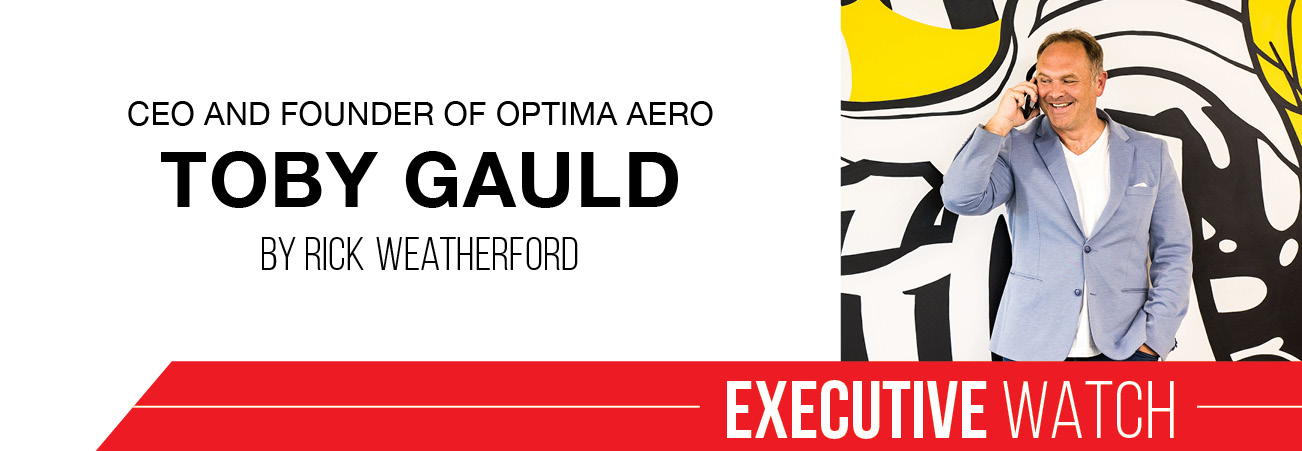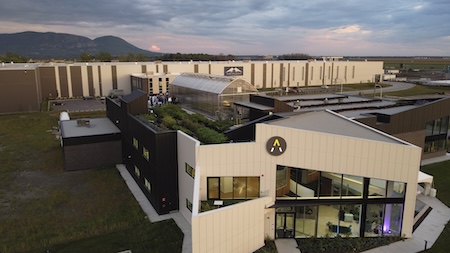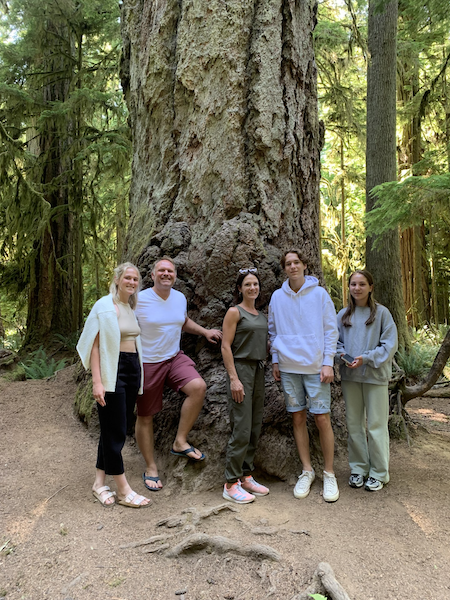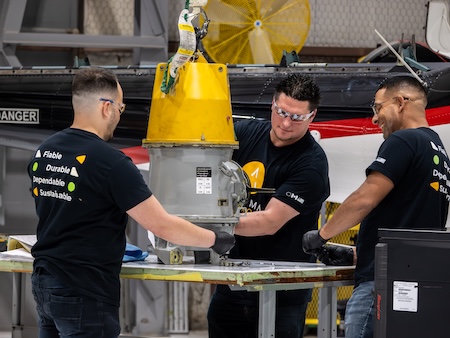|
Sep
15
2025
|
|
Posted 169 days ago ago by Admin
|
|

Optima Aero and its founding CEO have been having a “moment”—for approx. 15 years. Toby Gauld founded his business in 2010 from zero in Quebec, Canada, and his company has been adding numbers in front of that 0 by providing refurbished and certified parts, components, and engines to helicopter operators, maintenance centers, and OEMs worldwide. By “adding numbers,” we mean growing Optima Aero at a 38% annual rate (with 60 employees now) and putting a 42 in front of six zeroes to add up to $42 million (USD) in sales this year. Optima Aero expanded its Beloeil, Quebec, headquarters for engine maintenance and component repair to 30,000 square feet, plus has equally sized centers in Tarnos, France, for part-out activities, and Grand Prairie, Texas, for MROs. Expected this August is an Asian landing in Singapore to further spread Optima’s reach. The globally ambitious Gauld is also looking for acquisition opportunities around the world.

Family Values
This exponential expansion is understandable when one realizes that fast growth is a Gauld family tradition. Gauld is the oldest of five biological brothers, but his parents, who worked in Canadian public service, also became foster parents in a generous, self-sacrificing act that added children to their home big-time. “There were up to like 10 kids at a time in our home. My parents were always compassionate and helping out the next of kin and the like, so we were brought up with those values of helping others. Because of my parents, I want to make my family, my company, my community, and even my planet better,” says Gauld.
Gauld left that full house to find himself in college. “I was searching a little for my future and mission in life. I started and fizzled out in a few subjects, but then discovered industrial engineering and got my master's degree from Polytechnique Montréal.”
After graduating, Gauld stayed in “The Paris of North America,” to build Camaros for a couple of years at General Motor’s Montreal plant before they closed shop and afterwards it was on to Peugeot Automotive Manufacturing in the original France. Then he and his wife, Valery Lapointe, decided it was time to move back to Canada after their third child was born. Gauld became the maintenance manager for Pratt Witney-Canada in St. Hubert, Quebec. After working in after-market strategy there, he founded Optima Aero and started building his company from the basement up.

Building often requires patching holes. “We’re filling holes in the rotorcraft space by providing serviceable parts from helicopters. Our vision is to be the leader in extending the economic life of helicopters by re-using the most possible assets we have,” explains Gauld. “We’re cleaning up the yard, basically, by harvesting legacy parts and reducing the carbon footprint related to manufacturing new parts.”
600 Times
Reducing carbon footprints has become a cliché among corporations, but for Gauld, it’s a motivating force that drives his business. He explains, “In cooperation with my alma mater, we’ve created a calculator that estimates carbon reduction related to reusing parts in aviation and in general.” He says that the calculator estimates—and this makes ears perk up—that re-using parts reduces carbon emission by 600 times the weight of the part. Gauld explains, “For example, manufacturing a new one-pound part from raw materials emits 600 pounds of carbon into the environment throughout the mining and manufacturing process; when we re-use that part we avoid those carbon emissions.”
While this calculated conclusion gets attentive ears, Gauld realizes reducing carbon emissions is not music to every ear. “Now obviously, we work in Texas and realize there is some pushback against such carbon savings by thinking they are not that valuable or important, but what I’m saying is why not make the best use of our resources and assets; that’s low-hanging fruit. It’s better to have a clean backyard than a dirty backyard.”
Fantastic Four
For the still skeptical, Gauld makes a value proposition on behalf of his company. He says, “There’s four values that we provide to the industry: cost reduction by buying less expensive serviceable parts; parts availability in this age of supply-chain challenges; increased cash flow for our customers by buying assets from them; and carbon reduction by making the best, most efficient use of existing assets.” To reinforce this best-use philosophy, Optima Aero’s Canadian operation even makes best-use of its roof by growing a garden on it in the northern sunshine; employees enjoy their summers by taking home a weekly harvest of fresh veggies. (Do they grow okra and tomatoes? Just asking for a friend:)
Passion
One gets the sense when listening to Gauld, that the man really cares about these four values and that they mean more to him than a sales pitch. Throughout our interview, he says several times that Optima Aero exists to “clean up the yard” or to reduce helicopter-industry carbon emissions through recycling and restoring aircraft and parts that are becoming scarce.
He has passion for what he does and he says that’s his company’s key to success. “My leadership style can be summed up in one word—passion. As an entrepreneur, I’m passionate about innovation and about meeting and talking with people, but I also want to have fun and engage. We move and adapt in our space fast, so I want people who can do that and be leaders themselves. All that requires passion.”

Good Advice
Yet, Gauld is learning to temper this passion. “I thank the wise men and women on my Advisory Board who told me several times, ‘Don’t let perfection be the enemy of good.’ I’m learning to accept that sometimes good is good enough, especially when you’re starting up. As an entrepreneur who pushes himself very hard, it’s unrealistic to expect perfection from others. Developing a tolerance for imperfection was good advice I needed.” (Advisors include sages such as Larry Alexandre, president of United Rotorcraft, who is Gauld’s long-time friend.)
Gauld also heeded more good advice from his board. “I was also advised to invest early in quality processes that could handle increasing sales. It was an up-front cost, but I’m now so appreciative we did it because it brought us huge credibility by being ready to deliver on time and brought us ahead of the curve not only through innovation, but also through standardization. I like to say we’re a small company who thinks like a big company.”
That saying fits the helicopter industry because Gauld also sees it as a small aviation sector that does big things. “The rotorcraft industry is a small world where once you come in, you sort of cannot leave it. I’ve seldom seen people leave because it’s an industry that is so interconnected that once you’re in, you’re connected and have skills and knowledge that make you well suited to stay.” Make no mistake, Gauld has no intention of leaving rotorcraft. “Our company supports the EMS market probably more than any other and our support can make a difference as to whether an EMS helicopter flies or stays on the ground. So, it’s very rewarding to play a part in an industry that’s saving someone’s life. We are there when it counts. A helicopter absolutely can make a difference between life and death for someone.”
READ JUL/AUG ISSUE OF ROTOR PRO
READ MORE ROTOR PRO: https://justhelicopters.com/Magazine
WATCH ROTOR PRO YOUTUBE CHANNEL: https://buff.ly/3Md0T3y
You can also find us on
Instagram - https://www.instagram.com/rotorpro1
Facebook - https://www.facebook.com/rotorpro1
Twitter - https://twitter.com/justhelicopters
LinkedIn - https://www.linkedin.com/company/rotorpro1